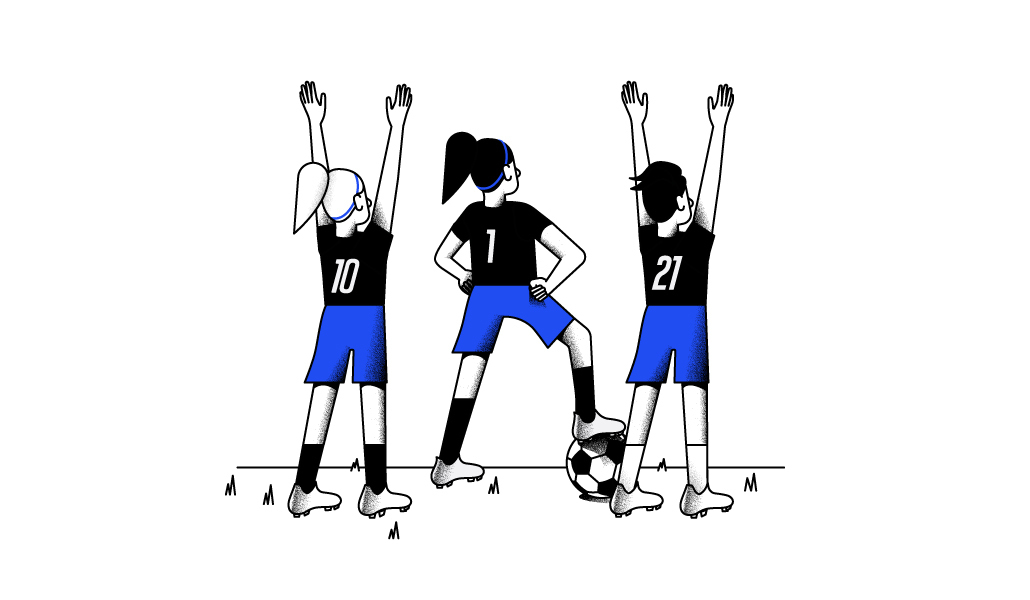How U.S. women’s soccer equal pay win is leaving other industries on the sidelines

The landmark deal that will see U.S. women and men soccer players share prize money from their World Cups equally, is being seen as a stepping stone on the path to wage equality elsewhere.
The conflict over the equal compensation has raged for years in courtrooms and at negotiating tables. To date, there has been a wide gulf between World Cup prize money earned by female and male players. For instance, the 24 teams at the 2019 Women’s World Cup in France, for example, played for a share of a prize pool of $30 million, the 32 men’s teams that will compete in Qatar this November will split $450 million. That’s now set to change.
Under the new agreement, the women’s and men’s unions will share the winnings from the 2022 and 2023 World Cups equally. So the $60 million prize for the women’s World Cup in Australia in 2023 will be added to the $450 million pot and divvied up equally between the teams.
Under the new, fairer system U.S. Soccer will distribute millions of extra dollars through a complicated calculus of increased match bonuses, pooled prize money and new revenue-sharing agreements.
“I think this achievement will have a positive influence far beyond the sports industry,” said Niurka Vidal, member of the NYC Soccer Officials Association and former referee with the U.S. and Venezuelan soccer federations.
“[W]omen professional athletes from other sports such as boxing and basketball, and even women who work in other industries not related to sports, but where the male gender predominates…will feel quite encouraged to seek equity not only in salaries, but also in other aspects such as more job opportunities and more support from the government and private industry,” Niurka told WorkLife.
Still, the World Cup windfall is in stark contrast with what non-sports women are paid in other industries. In 2022, women earn 82 cents for every $1 men earn when comparing all women to all men, according to data from the software firm Payscale. For women of color, the gap is even larger, black women made 75 cents for every dollar a white man made.
According to the Payscale data, 66% of employers plan to improve pay equity this year but fewer than one in four companies said they are actively addressing their pay gaps.
Manuel Sosa, member of the board of directors at the New York Soccer Referees Association and former FIFA referee in his native country the Dominican Republic, hopes the soccer agreement will set an example to other industries. “It will show the way, not only in the sport but in other professional fields that the way to get something is unity,” he told WorkLife.
U.S. Women’s National Team (USWNT) player and union president Becky Sauerbrunn, one of the five athletes who signed the original discrimination complaint in 2016, addressed the breakthrough in the official announcement of the agreement from the US Soccer Federation, on May 18.
“The gains we have been able to achieve are both because of the strong foundation laid by the generations of WNT players that came before the current team and through our union’s recent collaboration with our counterparts at the USNSTPA (the men’s National Soccer Team Players Association) and leadership at US Soccer.” she said. “We hope that this agreement and its historic achievements in not only providing for equal pay but also in improving the training and playing environment for National Team players will similarly serve as the foundation for continued growth of women’s soccer both in the United States and abroad.”
In another gender-related development in sport, women could officiate some matches at the upcoming men’s World Cup. For the first time in history, FIFA has tapped six females, three referees and three assistants, to be part of its 129-person roster of officials at the men’s competitions.
Female official Niurka Vidal said the move is long overdue. “FIFA had taken a long time to allow women to participate in a men’s soccer World Cup, since they are perfectly qualified to exercise that role.”
Vidal cautioned that the battle for equality isn’t over. “Machismo is still a reality in the sports world, and women have been fighting for their rights for many years,” she said, continuing: “This is a job that can’t be done in one day. It requires a lot of time, effort, and conviction. But also, a lot of courage, because it is not easy to be a pioneer in a sport dominated by men. However, there are always brave women who dare to take the first step and encourage others.”
The ref concluded, “I think that each woman athlete must contribute her grain of sand to continue achieving the equality and respect that we deserve in the industry of sports, no matter how long it takes. Sooner or later, we will reap the fruit of our efforts. And always, despite the difficulties, we have many people who admire and support us. So, let’s not be afraid to set the tone.”
